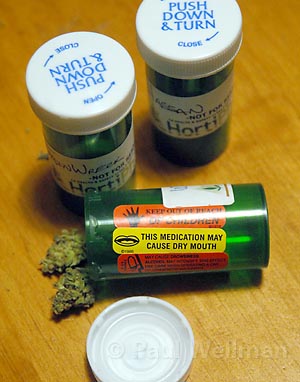Pot Dispensaries Face City Rules, Federal Crackdown
Raids and Regulations

As the operators of Santa Barbara’s remaining medical marijuana dispensaries braced themselves for possible federal raids, the ordinance committee of the Santa Barbara City Council met on Tuesday to grapple with how best to regulate the operation of such facilities-legal under state law but federally prohibited-throughout the city. Based on the remarks of the councilmembers involved, the regulatory approach will consist of a mix of the rules that currently guide the operation of pharmacies and adult bookstores. Borrowing from similar ordinances in about nine other California cities, city planners crafted a grab bag of proposed regulations that received mixed reviews from medical marijuana proponents and councilmembers alike.
Both sides seemed to agree that most dispensaries are already abiding by the conditions of whatever ordinance City Hall will ultimately adopt. The problem, said Councilmember Iya Falcone, is the five percent of the population responsible for 95 percent of the problems. Or as Councilmember Brian Barnwell stressed, there’s strong support for medical marijuana dispensaries, but not “the drift into recreational drug consumption” that occurs at some of them.
To minimize that side effect, the ordinance’s first draft imposes a 500-foot distance between dispensaries and any city parks or schools to buffer school-age kids from exposure to these facilities. The dispensaries would not be allowed to open next to private homes, though it’s unclear what distance would be required. The first draft would not allow any pot dispensaries downtown on State Street or on the Mesa. And while the language would have allowed such operations in the industrial sections of town, Falcone and Barnwell strongly opposed this, verbally painting pictures that evoked the gritty “underworld” of Batman’s Gotham City. Dispensaries would be allowed downtown, however, and in some sections of outer State, and most likely on Milpas Street.
Jennifer Nelson of Americans for Safe Access, a trade group representing dispensary owners, chided city officials for ignoring her offer to help draft the ordinance. She criticized many of the specifics of the city’s proposal, saying the 1,000-square-foot maximum size was too small to accommodate customers who use wheelchairs. Likewise, she rejected as “ridiculous” the city’s proposed prohibition against anyone with a misdemeanor moral turpitude conviction working at dispensaries. Lyle Holmes, a medical marijuana consumer on a fixed income, said the proposal to limit customers to one visit a month would make it impossible for him to benefit from marijuana’s medicinal virtues, as he couldn’t afford to buy his monthly allotment in one lump sum. Attorney Albert Bifano complained that the requirement that clients’ medical records be made available to city officials upon demand was too invasive.
For the most part, members of the ordinance committee echoed these complaints. Why ban dispensaries from operating during federal holidays, they asked, or keeping their doors locked at all times? Councilmember Falcone suggested that such regulations would result in a new generation of speakeasies. Councilmember Grant House suggested the once-a-month rule would require customers to carry larger amounts of cash and larger quantities of pot, potentially attracting criminals looking to steal either. Speaking of some of these smaller operational restrictions, House compared the dispensaries to pharmacies, adding, “Our goal is to get to a no-big-deal situation, and I don’t see how this helps us get there.”
The draft ordinance did not state what would happen to the dispensaries currently in business and how long they would be allowed to remain in their present locations. An attorney representing a marijuana center estimated only six dispensaries were still operating; that’s down from the 13 that were open this summer, and from the 20 for which City Hall has business permit applications.
Three months ago, the federal government conducted a “mail raid” on medical marijuana dispensaries throughout Southern California, sending letters to the property owners who lease space to dispensaries that threatened to file criminal charges and seize their properties. These letters prompted many owners to evict their pot-distributing tenants. Additionally, dispensary operators find themselves flinching at rumors about on-site federal raids. And no matter what ordinance the City Council eventually adopts, it won’t be sufficient to shield local operators from the wrath of the Drug Enforcement Administration.



